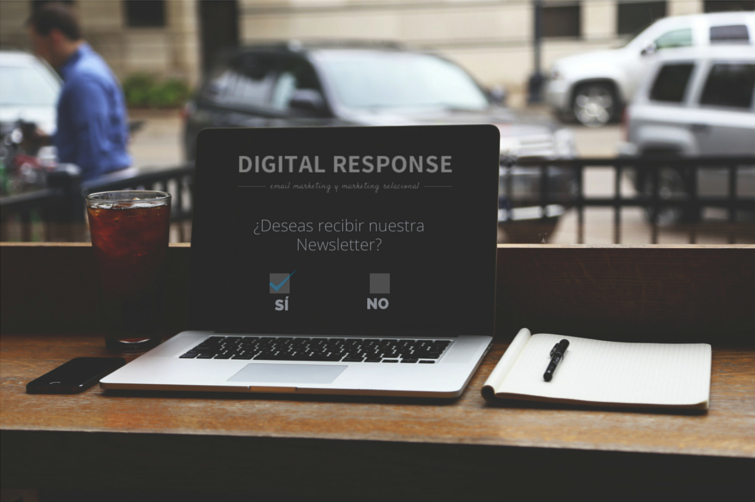Would you like to receive our Newsletter?

This should be the question that all marketers should ask their users. Or at least that's what Seth Godin thinks... The entrepreneur and marketing expert who gave his name to the concept known as "Permission Marketing".
Is the "Permission Marketing"A new concept of the moment? The answer is no. This concept was introduced by Seth Godin in 1999, but now it seems to be more important than ever. In this post we explain what is the Permission Marketing and why it has become so important.
Seth Godin defined the concept "Permission Marketing"or in English called Permission marketingas the ability to obtaining a user's or customer's consent to receive information about a particular product, service or company. In other words, it is marketing that does not disrupt the consumer's daily activity and it is expected, personal and relevant. It is a long-term relationship with the user where a close link is established between the brand and the user.
Nowadays we receive a lot of advertising messages every day, most of them unsolicited, and this makes the user unable to accept, even if they want to, each of the messages they receive. This is the task of Marketing... To improve day by day and find ways to make the user feel comfortable with commercial communications and to place their trust in brands. No matter how much you bombard a user with your communications, if they are not interested in what you offer, they will ignore them and the only thing you will achieve is to damage the reputation of your brand. For this reason, Seth Godin considered it important to talk about the concept of Permission MarketingThe users are the ones who choose which communications they want to receive.
Inevitably, this concept points directly to the Email Marketing. The basic pillar of the Email Marketing are the subscribers. Having their permission is vital, not only for the sake of engagementbut also by LEGAL ASPECTS. Getting users' permission to send them commercial communications via email is no longer an option, but a regulatory obligation that will also be decisive when it comes to achieving the best results in email marketing campaigns.

The essence of this concept is based on respect and consideration of users' tastes and interests. If you analyse it carefully... allowing our users to decide what they are interested in or not is the most logical and at the same time, the most effective thing to do. What is the point of sending emails to people who we know for sure that they have no interest in our brand, product or service? It is a waste of time and effort. It is more worthwhile to focus our energies on those who have explicitly decided that they want to receive our information. And work to send them the most relevant information according to their tastes, interests or needs. Otherwise, you will damage your brand and provoke discomfort in your target audience.
In fact, without that consent, the fine line between commercial email and SPAM can be blurred. After all, a commercial email is an email that is sent in response to a specific interest of a user and in which it is imperative to have the explicit consent of the user. Otherwise, we are no longer talking about commercial email, but about SPAM. SPAM is any email sent in bulk, without the consent of the users and without taking into account the interests of the recipients. Therefore, a good use of Email Marketing in itself indirectly implies applying the concept Permission Marketing.
When we talk about Permission Marketing in Email MarketingWe talk about the fact that having a quality database is a vital factor for the success of our campaigns. Our database should only contain those potential customers who have expressed an interest in our brand. Only in this way, we will be able to convert these users from customers to followers, and from followers to loyal customers. There are several methods for the acquisition of recordsall based on the user's confirmation to receive our emails.
However, it is important to keep in mind that just because you have someone's email address, it does not necessarily mean that you have their explicit permission. Many times users subscribe to your forms for a specific purpose, for example, to download a whitepaper Does that mean that the user wants to receive communications from time to time? Not necessarily. It may be that some users are interested, but we cannot assume that this will be the case for everyone. Moreover, it is important to bear in mind that most users do not sign up for your newsletter to be bombarded with information all the time. In fact, the essence of the Permission Marketing is in the fact that the user misses you and looks forward to receiving your communications. If this is the case, it is a sign that you are doing very well. We often make the mistake of thinking that the more the better. And it is actually the opposite. What users are looking for is quality, not quantity.. We all want to be known, to be sent things that interest us, and to care about our tastes.
Undoubtedly, the success of the Permission Marketing lies in listening to users. If this is accompanied by the detailed segmentation of our database users and a personalisation of our communicationsThe user experience is greatly enhanced by offering users a unique and personalised service. At Email MarketingIf you want to do things well, it is very important to establish a relationship of trust with the potential buyer of your products or services. It is very important that users feel that they have the power of decision and feel respected and valued by brands.